

Kleptocrat Country
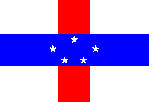
Antillean flag
political reality
even if sounds surrealistic
caveat emptor:
Much of the information below is not valid any more. However, it certainly was valid at the time it was first uploaded.
To check out the present situation, the political circus is as good a place as any - a better place than most.
| You may not be very interested in the political problems of a mere 150,000 people, if that. Hardly anybody is but we. But it can happen everywhere, to anybody, as history and TV-news keep showing. Hodie mihi, cras tibi - "I today, you tomorrow". |
In 1993 a referendum was held on our future political structure, where we were given 4 choices:
 | THE REFERENDUM IS YOUR BUSINESS! A. remain part of the Netherlands Antilles B. become an autonomous country in the Kingdom of the Netherlands C. become part of Holland D. become an independent state |  |
All our political leaders (and how can I resist the temptation of adding "such as they are"?) advised us to vote for option D. No doubt they had excellent reasons of their own. However, a foundation PAR (Pro Restructured Antilles) was established which started pushing for option A. Much to the chagrin of the politicians, the public did so vote; not merely with an overwhelming majority, they also turned up to vote in about twice as large numbers as for regular elections. The example of what had happened in Suriname after that country went independent in 1975 may have helped here (40% of the population went to live in Holland). We had much fun watching our Leaders on TV that night, all perplexed and dazed - they had never expected this. So much for their contact with the, not voters, but people. The best they could do was sheepishly admit that, as this was the wish of the people, they would fulfill it. Hah!
PAR was then turned into a political party and won the coming AN elections easily. Their first PM was Pourier, a former Tax person, once called makamba chupadó (sucking honky) by a colleague. Minister of finance was Etienne IJs - also a former Tax person! Hmmm. After a couple of months, he became a deputy in the local Curaçao island government, and was replaced as minister by Henriquez, definitely not a politician, who after a couple of weeks discovered that the country was teetering on the edge of bankruptcy, and called for measures. Same teetering was caused by the totally irresponsible ways of former governments.
|
"Our" government does not seem to be working for us but rather seems to try ****ing us in our collective ***-****s. Some of the anti-democratic measures taken in the past few years: Search warrants are no longer needed for the police to enter private houses and premises. Building permits are secret to make it impossible for the public to make due protest. Privacy of letters - customs open mail in the addressee's absence. Taxes - if the Person does not respond to your appeal within nine months, too bad: you have lost. |
The reforms (stop me if you've heard this before) consisted of raising taxes on virtually everything - like 40% import duties on automobiles! Shortly after he was installed as PM, I chanced to run into that same Pourier on a supermarket parking lot, fondly admiring his brand-new expensive yuppie-mobile. He could afford it, by then: Besides their salaries, they also raised their pensions, already quite exorbitant. (If you have been a minister for 3 years, you get a pension. If you become a minister in a later government, you get the pension twice.)
We got a 5% purchase tax. Some 40 cents on each guilder spent go to the government in some form of taxes. Fuel (the life-blood of this economy) keeps going up, and with it energy rates, already among the highest in the world. Don't even ask about income tax. Small wonder the economy ground to a halt, which left the government with less than when it started. Which didn't stop them from giving themselves a hefty, not healthy, salary increase.
The dilemma is this: This is like a pre-glasnost government bureaucracy. About 60% of registered voters actually take that trouble; it's a fair guess because the rest have given up all hope that it will make any difference. Those who do vote are for a large part government workers, who at election time even get days off for campaigning. As you'd expect, most politicians come from the bureaucracy. When you have done something for a political party, you will be rewarded with a government job, or one in a government-owned company like utilities, telephone company UTS or ALM Antillean Airlines as a matter of course. Or you will become a driver for a minister, whatever.
In July 1995, when reductions started, the island goverment still had 3673 employees, about 1 per 10 taxpayers; by July 2003 this had been reduced to 1401. In May 2004, nine months of FOL government had accomplished nothing but a new increase of 172 new employees, at least: details on April aren't in yet, and in March alone 37 were hired.) However, it is hard to get official figures on the amount of bureaucrats in service of the country; makes one wonder. A reasonable 2004 estimate is about 4000 government workers in Curaçao (1 government worker, island or country, for less than 9 voters.) It's not entirely clear if 31 charpersons are part of the quoted figure of 172 new employees. These were first fired en then re-hired.Thisprivatizationcost the government 4.2M guilders, presumably per year. By re-hiring them 1.2M was saved. The average cost per worker, now, is 100K guilders/year, say US$56K. They probably make some $13K in salary/year each. As these guys don't need an office, that means they are supposed to spend $40K/year each on mops, buckets and soap? That's not so easy to believe.
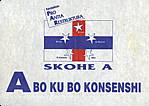
Vote for option
A
YOU and your conscience
PAR 1993 chutzpah
Under IMF pressure, reinforced by Holland cutting practically all financial aid, the government is supposed to have cleaned up its act, but we only notice taxes and prices keep going up. They are proud that they (2002) have, for Curaçao alone, a budget deficiency of "only" US$2.8M a month - which works out to almost $900/family/year. Apart from what we pay in taxes, of course. They are even prouder that the economy, after at least 9 years of steady deterioration, grew in the same year. With 0.7%! In 2003, this was 0.5%, but Government grew with 4%. Hmmm. Meanwhile, they started to privatize telephone and other utilities; all these guys were government workers as well. A lot of money has been made that way; when the postal service was privatized it made a deal with the Canadian mail. The director is now being investigated by the attorney-general, which has not stopped our new P.M. from enlisting his services as an aid. Anyway, it must have become obvious to even meanest intelligence politicians that this is killing the goose that lays the golden eggs, and they want to end the privatization process.
Our former PM was the same IJs who never noticed as a finance minister how bad things were going. He was my counterpart in a (very successful, thank you) action I brought against the tax person; he then sported earrings, which he changed for a shaven head—what in Papiamento is called "prickhead" (kabé patín)—after he became a Big Shot (he's letting it grow out again). One of the things I learned is that being a liar and schemer does not necessarily make you a good politician.
As it turns out, the politicians (including PAR!) have silently, secretly, stealthily, surreptitiously, and conspiratiorally been plotting for a future autonomous Curaçao for years. While there have been strong signals (what do I say? Statements!) from Holland that this is not acceptable (it figures they shrink back there from having to deal with 6 of those miniature megalomaniac island states, each with a wee PM and ministers), they are still proceeding in their presumptuous arrogance. But now, according to newspaper Amigoe they have first voted for a motion on autonomy, and later in 2004 will hold another referendum (in August it was announced this will be held in March 2005.) They (hopefully wishfully) think this will forestall the 1993 disaster (for them it was that). That self-same PAR, the Yellows, is now all for it! But they have been members of parliament for some 8 years now and presumably meanwhile have discovered how autonomy would be to their personal advantage. One thing that gives hope is that they can't agree among themselves how to cut up the cake. Rather negative news is that Holland, finally getting a government together in May 2003 after an eight month struggle seems to have given in on this. The good news is that Holland also states that if a helping hand has to be extended, the Antilles will have to give up some of their precious autonomy. You see, if they remain independent, there is much less control on their ways of making money.
| It Couldn't Happen Here or, Famous Last Words One of the more bizarre right-wing affairs of the [1980s] On the night of April 27, 1981, at a marina along the wooded north shore of Lake Pontchartrain near Slidell, Louisiana, federal agents swooped down on ten men about to board a boat bound for the tiny, impoverished island of Dominica, 2,000 miles away. On the boat were weapons, including machine guns and explosives. Among the group were two Canadian right-wingers, a former Kansas police chief, and assorted Klansmen, including Black, at the time Imperial Wizard of the large Knights faction. Dominica, only [46 by 26 kms] with seven thousand inhabitants, had a moderate government opposed by some members of the small army still loyal to the imprisoned former Prime Minister, Patrick John. The ten mercenaries, some believing they had been hired to fight communism, were to slip ashore at Roseau, the capital, attack the island's police station, and depose Prime Minister Mary Eugenia Charles. Patrick John, a black man who had led Dominica to independence from Great Britain, allegedly offered the mercenaries tax-free concessions to the island's resources in return for their help. [...]The FBI's code name for the investigation was "Bayou of Pigs." The Silent Brotherhood, Kevin Flynn and Gary Gerhardt, NY 1990 |
In the last months of 2002, arrests started of politicians for alleged fraud. We could only hope this trend continued, and it did: Shortly before the May 2003 elections, the leader of FOL, Orange, was arrested. His followers protested he was a political prisoner - that's a laugh! Especially since he was released the day before the elections - and WON them. Woe is me: The whole mess has now been in court and the judge judged all but one were guilty as hell. He went just short of expressing his sorrow that we don't have capital punishment. As FOL leader Baby Papa stuck to both of his seats regardless, we had a convicted crook in our island and our national government.
It's rather amusing that FOL, which is supposed to be so anti-colonial and anti-Dutch, has chosen orange for its color - the Dutch national color, more or less (
William of Orange, Father of the Fatherland). (Remember how the Nazis were fond of walking around in the same color shirts? only, theirs were brown. You should check P.G. Wodehouse for some real laughs on this one.)
For your wheeling and dealing with Nelson Monte, the real FOL leader, you had to pay a visit to prison where he resided.
With these elections just around the corner, our gasoline prices were lowered, with almost 3%! Right in the face of the problems with Iraq and Chavez in Venezuela, too. Now was the chance to get a hardtop on the road your house is on - just fly a green political party flag. No kidding! But the Greens lost; that's the good news. You'd think so? Well, not exactly. Sorry, can't blame you if you feel this is getting too intricate, but the Greens and the Pinks (really! we have such a thing—their proud banner always makes me think of skirt persons' underwear) have ganged up with the Oranges to form an island government coalition, with the result that the country government fell as well—the Greens and the Pinks were coalition members with the Yellows.
What happens next? One thing is for sure: We confidently look forward to higher gasoline prices—in a little while.
A month after we got rid of the FOL government, Curoil announced a gasoline price raise of 35%. One might well ask what has been holding it up.
The new minister stated they could hike up the price that much "over my dead body." She's still alive but, to our amazement, the price hike was much less than originally announced.
The Orange man has indeed not been accepted as a Prime Minister. He was showing his true color (braun rather than orange) even before he was elected. At a labor conflict at Hato Airport, in the best Adolf Hitler tradition he went over there personally and promised the strikers that he personally would see to it that their wishes would be fulfilled; i.e., that this would not be solved in the democratic process. And it was not: It did not even matter if he actually is Prime Minister or not. The guy who became minister of justice wanted to get his brother in, as an aid (they're thick as thieves); on that guy the verdict is in: his fraud with the N.A. Post was not just "alleged". But finally, Godett decided to keep it in the family and put his sister on the P.M. Throne. This started getting so outrageous, sad but funny, that their acts deserved a page of their own.
Things were growing less and less funny by March 2004. With FOL commercials on television practically inciting people to riots, we were getting afraid the Godett Gang would shortly resort to sending out goon squads onto the streets. Shades of Adolf Hitler? Once more, one started wondering if democracy really is the answer.
By May 2004 things had got so bad for FOL that they were forced to resign. It seems very hard to form a new coalition, small wonder. Meanwhile, FOL was still in power — who knew what they were doing?
The Verdict
In the court of appeals, in July 2004 the judge gave longer prison terms to Anthony Godett (15 months), Nelson Monte (4 years) and ex-minister Rob Salas (1 year). Godett swore he would take this to the international court of justice if necessary, and expects everyone in Curaçao to support him with 1 guilder. From me, this "state-of-the-art victicrat" can expect a 2½ cents coin, as a gesture. He'll have to come and collect it himself, though—sans goon squad. The rest of the gang got a total of 32 months; Foundation Papa Godett was fined ANG40,000 for money laundering. Then, in September 2004, they were arrested again for more alleged fraud.
| Free Trade: Although the Netherlands Antilles has signed the GATT treaty, they can't seem to understand what that means. The exorbitant 40% import duties for protectionof our own industry (which meant welcome government income) are being phased out under IMF pressure. But around September 2002, merchants discovered it was much cheaper to import soft drinks from Venezuela or the USA than to buy the products of the local Pepsi-Cola and Coca-Cola bottling plants. They're half the price now - fancy that. The minister of economy, nickname Errol Bakoba ['banana'], wanted a foolish ad-hoc law to stop this - but that was no market protection! No, it was because the imported product was inferior, or had been produced over there with government subsidy - Coca-Cola? Anyway, it's still market protection. (He seemed to have given this up, but was at it again by end of February 2004.) |
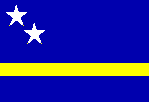
Curaçao flag
Corruption is rife. A sewage processing plant built here turned out to be twice as expensive as in England. A 1 km stretch of road cost as much as a road built at the same time right across Taiwan, through the mountains. The much-touted mega-pier for tourist ships ended up twice as expensive as planned; although it's not nearly used to capacity and business actually got worse since 9-11, they still want to build a second one. The Central Bank's new building had to become twice the size the bank itself figured it needed. I personally know a man who took a suitcase full of money to Holland for a contractor. And an interior decorator who maintains she has seen lists, black-and-white on paper, how much kickback for a certain project went to which persons. And so it goes on. And on.
Small wonder that the people are leaving in droves for e tera friew, the cold country - Holland, while they still are Dutch citizens and have a Dutch passport. And where they won't have to vote on a referendum every ten years to safeguard their future. (When in 1975 Dutch Guyana became independent Suriname, 40% of the population left for Holland, never mind the referendum.)
In September, the people of Bonaire island in a referendum overwhelmingly opted for a direct relation with Holland, while St. Martin has already chosen for an Aruba-like status aparte. Saba, St. Eustatius will shortly have their own referendum, and finally Curaçao another one in March 2005 (if we make it).
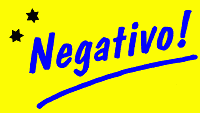
sticker-spoof for downloading
We all have to remain Positive!
Not so easy...
News Flash
Since early 2004, there has been talk of yet another political party! As if we didn't have more than enough of those already - at least eight, but it's easy to lose count. This one is planned by a lawyer, Navarro. Remember Shakespeare?June 2004 the FOL government has been replaced.The first thing we do, let's kill all the lawyers. One of his cronies is a Camelia who, like most of us, doesn't always bother with what the Law says - I hope he doesn't try to sue me for slander; for his sake. Other prominent members are Tax Persons, again.Now, is that an ideal team to fight corruption?
The new one is the spitting image of the one before all the orange trouble started;
we can only hope they learned a lesson.
Ministers now sign a paper promising they will behave ethically,
and we saw them all swear their customary oath.
What Happens Next? One can only hope for the best.
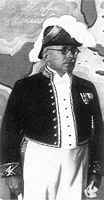
WWII Curaçao governor Wouters
Any government anywhere is a thing of exquisite comicality.
Joseph Conrad, Nostromo

politician
after election victory
Like they said in the 2002 Johannesburg conference discussions on democracy:
"We are your leaders. Why don't you do as we tell you?"
New Scientist
A book you may wish to read:
Imperialism and the Anti-Imperialist Mind
Lewis Feuer
"We may vote for a Boss once every four years"
Democratic elections are popularity contests - Larry Niven
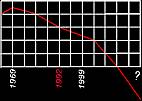 |
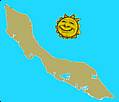 |
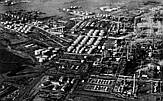 |
| economy | geography climate |
tourism |
visit our circus—laugh until you weep


POPULAR POLITICIANS FROM THE PAST
or the Monster Gallery
 |
 |
 |
 |
 |
| Henry VIII | Napoléon | Adolf Hitler | Joe Stalin | Idi Amin |
AN EVEN MORE POPULAR POLITICIAN
If you think there have been succesful and, at the same time, decent politicians, I will not try to reason you out of it.
There are 2 (two, count 'em) names people mostly come up with: Adlai Stevenson II (USA) and Mahatma Gandhi (India).
Click on their names to find out more about them.

King of the Apes
Politics and economics are concerned with power and wealth,
neither of which should be the primary, much less exclusive, concern of full-grown men.
Dictators are always small people.
Arthur C. Clarke, Profiles of the Future, 1984
Watch out for small men, because they hate you for every inch you're taller.
Jan de Hartog, The Captain
| They asked us! |
| UNA university polled the Curaçao population in February 2004: Over 50% of 281 polled had no confidence in present island and
national government. Political leaders, trade unionists and
entrepeneurs were generally mistrusted, and almost all political
parties would lose votes in a new election. Over 70% think the
government should go away and leave us in peace, and almost 60% wanted
Holland to interfere. A month later, all these feelings had become even
more pronounced. Sweet dreams, Holland interfering! We have voted for our cake and now must eat it, crumbles, burnt crusts, rotten fruits and all. |


Curaçao Island live in real time
SEARCH this site or the Web

copyright notice
all material on this site, except where noted
copyright © by , curaçao
reproduction in any form for any purpose is prohibited
without prior consent in writing